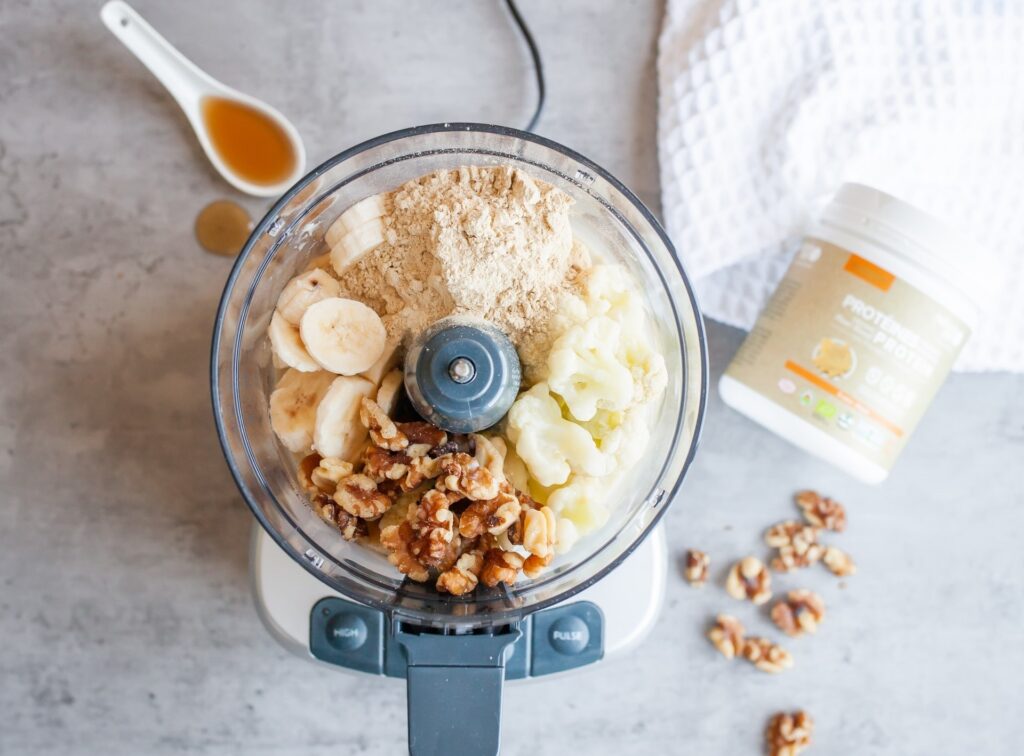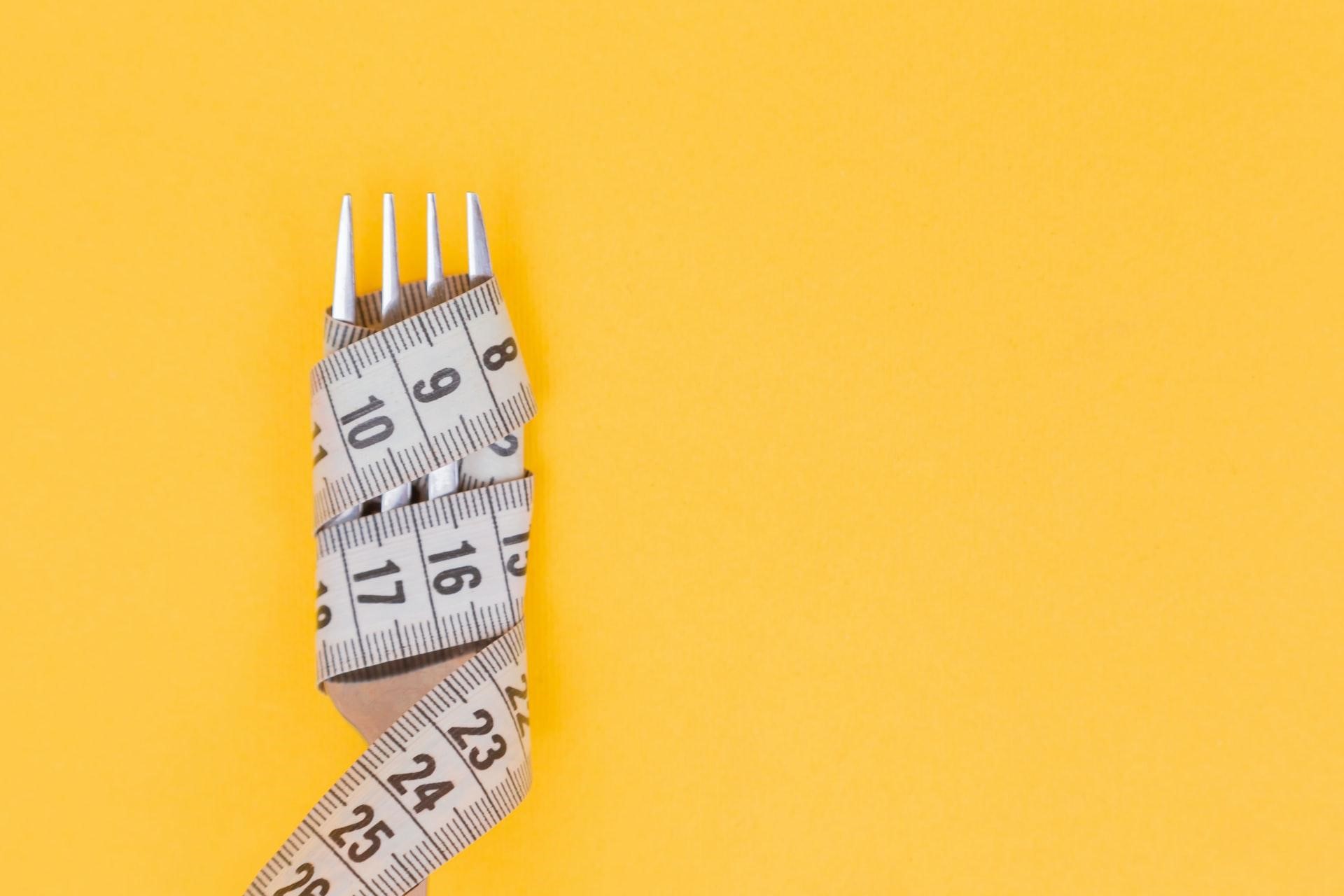Consuming protein powder is believed to offer weight loss benefits, since protein is the most satiating macronutrient.
In fact, a high protein intake reduces the appetite, improves the metabolism, and changes weight-regulating hormones. All these benefits lead to reduction in hunger and make you eat less calories automatically.
However, can a protein powder make you gain weight? Let’s find out.
First, How Much Protein Do You Need?
Protein needs vary based on gender, physical activity, age, and whether one is pregnant. The FDA recommends adults to consume 50 grams of protein daily as part of their 2,000-calorie diet.

If you’re new to nutrition, meeting a registered dietitian who will provide you with personalized guidance is helpful. You can also use a general nutrition calculator online to get a specific protein estimate based on age, gender, and weight.
Protein powders are a great source of protein because they are easy to access, portable, often low in fat, and can be mixed with whatever you want for a protein boost. Adding protein powders to foods, such as pancakes or oatmeal, also make you feel satiated longer after breakfast.
But of course, you have to account for the extra calories.
So, Does Protein Powder Make You Gain Weight?
Yes and no. And the reason why it’s not a clear-cut answer is because a variety of factors are involved, such as the type of protein powder you’re consuming, how often you consume it, and the protein powder blend itself.
Protein alone or other types of macronutrients will not make you overweight. Protein powders will not increase belly fat or weight unless your supplement habit exceeds daily caloric needs.
For instance, if you add protein supplements to your diet without adjusting your foods to accommodate the added calories, you may start to gain weight. When there’s too much extra stuff (like added sugar) in the protein powder, it can also make you gain weight.
Still, a fairly long-term clinical trial reveals that consuming a high protein diet can prevent gaining weight after losing it.
So, if you prefer to consume protein powder to add pounds healthfully, there are protein powder blends that are specifically designed for the goal. Some organic protein powders have even been linked to muscle building and improved endurance and strength during mobility routines and workouts.
Additionally, there are whey protein supplements that make you both lose weight and preserve lean muscle at the same time. Whey is a mixture of proteins that contains an excellent range of essential amino acids. This is a great type of protein to choose if your goal is to lose weight.
Protein shakes can be dense in calories, which easily and quickly increases your calories in the body without consuming high-calorie foods. The high-calorie foods are often packed with hidden ingredients and are unhealthy, which will do no favors to your body. So, if you take in fewer calories than you burn during the day, you will lose weight.
Ultimately, it all comes down to your health and fitness goals. Protein powder is not all about helping you lose weight. It also supports several fitness and health benefits, including getting lean, muscle repair, and gaining weight healthfully.
How to Choose a Healthy Protein Powder
Each person has unique preferences, physiology, and goals. So, there is no single protein powder that is ideal for everyone. However, there can be a healthy protein powder that can tailor your protein use.
Here are ways you can find the best protein powder for you:
Read the packaging before buying
Protein powders are dietary supplements, meaning they don’t need FDA approval to be offered for sale. Aim for a protein powder that contains around 20 grams of protein and 150 calories or less per serving.
That being said, paying attention to how you feel after consuming a protein powder is advisable. Some people find a morning protein shake better as it makes them feel full longer, while others opt to take their protein drink before working out.
Assess the protein quality
The quality of protein should be one of your priorities when choosing a healthy protein powder. It’s wise to consider powders with third-party certification, like the Informed Sport or NSF. These certifications will inform you that banned substances are now hiding in the product.
Opting for organic protein powders likewise ensures the purity and quality of the product. Whey protein powder is often recommended for post-workouts because it is rich in BCAAs, is fast-digesting, and is an incredibly high-quality protein.
Meanwhile, milk-protein blends have been promoted as the “best of both worlds” because they provide both slow- and fast-digesting protein.
Choose protein powders without added sugar
Another tip is to choose a protein powder without artificial sweeteners or sugar. This tip will avoid spiking or elevating blood sugar levels, which may hinder your workout progress, results, and performance. Many keto-friendly protein powders work.
Patients diagnosed with diabetes should also opt for protein powders that are safe for their health.
Match the protein powder to your needs
Pick a protein powder based on the outcome you’re hoping for. Choose one with no added sugar or dextrins and maltodextrin for weight loss. Avoid choosing protein shakes with added BCAAs, as they promote weight gain and muscle growth.
For muscle growth goals, whey isolates and whey protein are your best options. This is because these are protein powders with the highest biological value, which measures how well the body utilizes and absorbs a protein.

To know whether you need to gain weight – in the form of fat or muscle – you have to determine your daily calorie intake. Burn more calories than you consume, resulting in weight loss. Consuming more calories than you burn, it’ll result in weight gain.
Meanwhile, if you’re on a dairy-free diet, there are dairy-free and gluten-free protein powders for you. For instance, soy protein powder is a complete protein and is effective for muscle growth. Research evens that soy protein supplements produce the same gains in lean body mass and strength as whey in response to resistance training.
If you’re a vegan or vegetarian, don’t purchase milk-based protein shakes (example: milk proteins, whey). Instead, choose 100% plant proteins. If you plan to increase protein intake, it’s essential to ensure your diet still contains a good amount of fiber, including whole grains, vegetables, and fruits.
The Bottom line
Protein powders are acceptable to incorporate into a healthy weight gain or weight loss plan.
As long as your total protein intake will not exceed the recommended daily amounts (RDA) of protein and you keep your fitness goals in mind, the number on the scale doesn’t really have to paint the whole picture.
Also Read: Crumbl Cookie Calories | Crumbl Cookies Nutrition Facts


